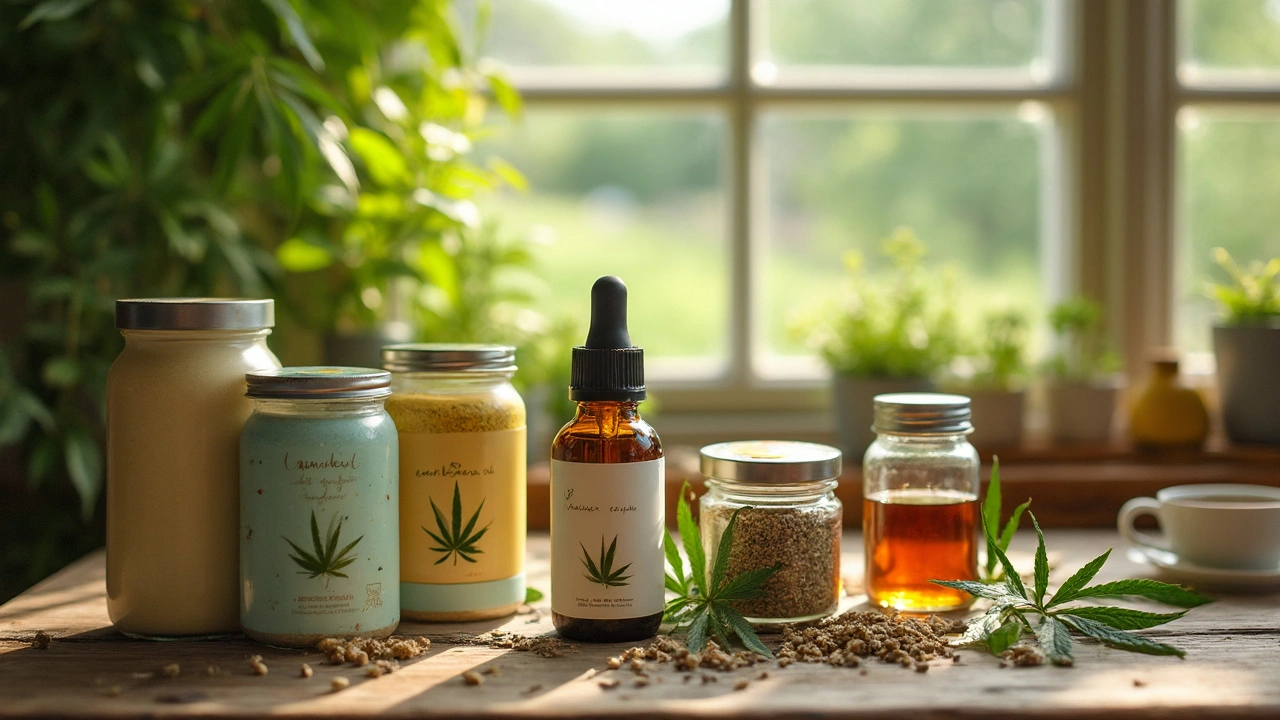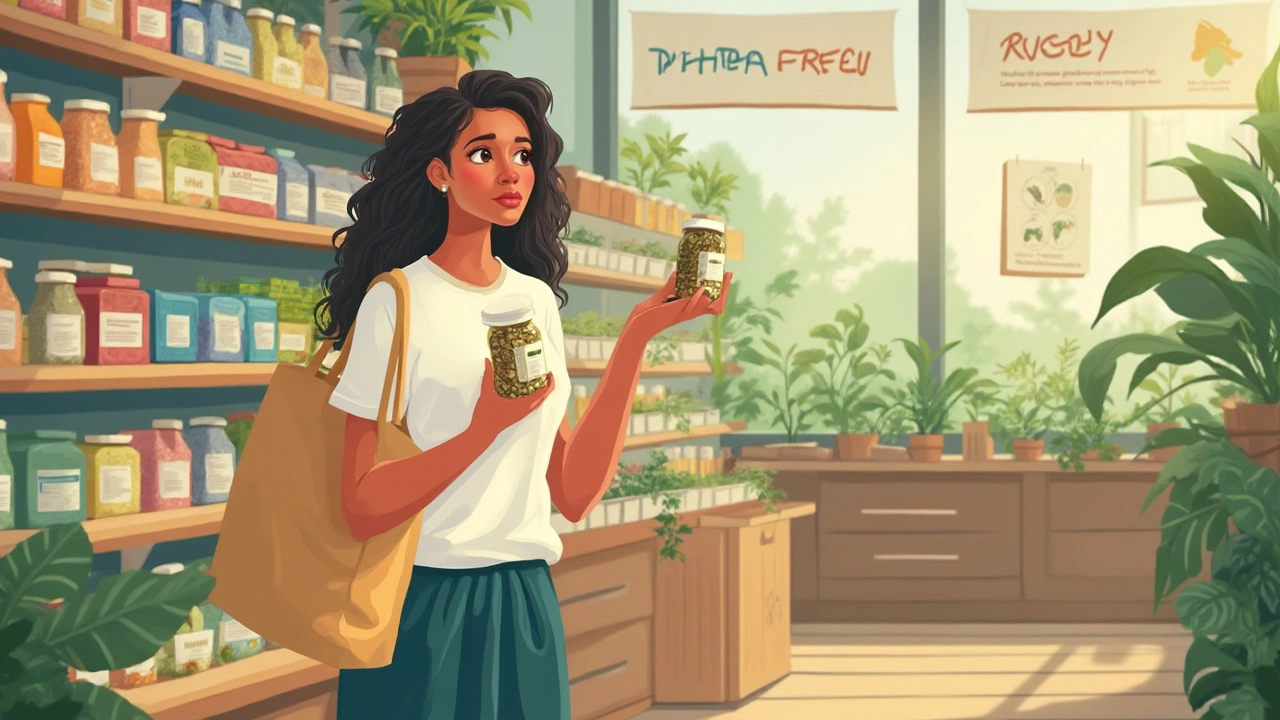
Forget bland vitamin pills—Canadian hemp supplements offer something a lot more exciting and planet-friendly. If you’ve been searching for a supplement that packs a punch without busting your budget or harming the environment, hemp should be on your radar.
Even a quick look at a bag of Canadian hemp seeds or oil shows a nutritional lineup that’s hard to beat. They’re loaded with plant protein, healthy fats, fiber, and a bunch of key minerals. What’s wild is that these tiny seeds offer natural omega-3s plus iron and magnesium, stuff a lot of folks need more of every day. Best part? It’s all from a crop that barely sips water compared to others and doesn’t demand harsh chemicals.
- What Makes Canadian Hemp Stand Out
- A Nutritional Powerhouse Explained
- Real Environmental Benefits
- Making Hemp Part of Your Day
- Tips for Picking Quality Hemp Supplements
- Clearing Up Hemp Misconceptions
What Makes Canadian Hemp Stand Out
When you pick up Canadian hemp supplements, you’re getting more than just a trendy new superfood. Canadian hemp is grown under some of the tightest agricultural rules in the world, which is a big deal for quality and safety. Canada’s climate—cool, clean, and with long hours of summer daylight—gives hemp plants a steady, healthy growth cycle. That’s why you see such consistently high protein and omega levels in these products.
You might have noticed labels bragging about “grown in Canada.” This isn’t just marketing. Canadian hemp farmers have to meet strict federal guidelines on everything from non-GMO practices to avoiding certain pesticides. That means when you grab a bag of Canadian hemp hearts or oil, you know exactly what you’re getting—and what you’re not getting, like hidden chemicals.
Transport also matters. Most Canadian hemp supplements make their way from farms in places like Manitoba or Saskatchewan right to your local store without sitting in shipping containers for weeks. This keeps their nutrients fresher and makes their carbon footprint way lighter than imports. Here’s a quick look at a few reasons Canadian hemp punches above its weight:
- Strict quality controls: Federal regulations keep standards high for safety and purity.
- Non-GMO by default: Regulations mean Canadian hemp is almost always naturally grown—no genetic modifications.
- Consistent climate: Cool Canadian summers let hemp thrive, boosting nutrition in each seed.
- Support for family farms: Most Canadian hemp is grown by smaller, local farmers plugged into their communities.
To drive it home, check out this quick stat breakdown of what sets Canadian hemp apart:
| Feature | Canadian Hemp | Typical Imports |
|---|---|---|
| GMO Status | Non-GMO | May Be GMO |
| Pesticide Use | Strictly Regulated | Varies by Country |
| Transport Time | Short (domestic) | Long (overseas) |
| Freshness | Very High | Lower |
So when you choose Canadian hemp, you’re not just making a healthy pick for yourself—you’re supporting smarter farming and a cleaner food system, too.
A Nutritional Powerhouse Explained
There’s a reason why people are buzzing about Canadian hemp right now: it’s actually one of the most well-rounded foods you can add to your diet. Hemp seeds are considered a complete protein, which means they give you all nine essential amino acids — something rare for a plant. Per three tablespoons, you’re looking at about 10 grams of protein. That’s not far off from what you get in a scoop of standard protein powder, but with zero additives or weird aftertaste.
The fat in hemp supplements is impressive too. Instead of being packed with saturated fats, hemp offers heart-healthy omega-3 and omega-6 fatty acids in a perfect balance. Your body can’t make these, yet they play a big role in brain and heart health. You won’t even taste any fishy flavor like you get from fish oil capsules.
| Nutrient (per 3 tbsp hemp seeds) | Amount |
|---|---|
| Protein | 10g |
| Omega-3 (ALA) | Approx. 2.5g |
| Magnesium | 50% daily value |
| Iron | 15% daily value |
| Fiber | 1-2g |
Another winner: minerals. Canadian hemp is loaded with magnesium, which helps manage stress and muscle cramps, and iron, which you don’t often find in such a convenient plant food. You also get B vitamins and zinc, so you’re covering a lot of bases in just a spoonful or two.
"Hemp seeds are one of the few plant foods that contain complete protein, making them an easy source for people following plant-based diets," says Dr. Carla Prado, nutrition professor at the University of Alberta.
You won’t see sharp blood sugar spikes either—hemp’s slow-burn energy comes from its fiber and protein. Some folks even toss hemp hearts into oatmeal or smoothies for a boost that actually keeps them full longer. And because Canadian hemp is almost always non-GMO and rarely sprayed, you can feel good about what you’re eating. No need for complicated prep or fancy recipes—just sprinkle and go.
Real Environmental Benefits
Canadian hemp really stands out when it comes to doing good things for the planet. Compared to almost any other crop, Canadian hemp takes way less water and hardly needs pesticides. That makes it a smart pick for farmers who care about both yields and the earth.
Hemp roots dive deep, loosening up the soil and making it healthier for later crops. Plus, hemp plants grow crazy fast. They’re ready to harvest in three to four months, even in Canada’s short summers. This speed helps farmers get more out of their fields using less land.
| Crop | Water Used Per 1kg Product | Average Growing Time |
|---|---|---|
| Canadian Hemp | 300-500 L | 3-4 months |
| Soybeans | 2,000 L | 5-6 months |
| Almonds | 16,000 L | 7-8 months |
What about air quality? Hemp is a star at capturing carbon dioxide. For every ton of hemp supplements grown, the plant pulls about 1.62 tons of CO2 from the atmosphere. That helps fight climate change in a very direct way. According to a 2022 report from the Canadian Hemp Trade Alliance, “hemp is a workhorse for carbon sequestration, making it one of the most climate-friendly crops on the planet.”
Hemp is a workhorse for carbon sequestration, making it one of the most climate-friendly crops on the planet. – Canadian Hemp Trade Alliance, 2022
And there’s more. Hemp fields leave behind wasted parts like stalks and leaves, but even these leftovers aren’t really waste. They’re often turned into animal bedding or even paper products. This means fewer things end up in landfills, and the whole process is pretty close to zero waste. That’s the kind of practical detail that’s easy to overlook but makes a big difference.
So, if cutting your food’s environmental impact matters to you, adding hemp supplements to your routine definitely pulls weight on the eco-friendly front.

Making Hemp Part of Your Day
Getting Canadian hemp into your daily routine is easier than you probably think. You don’t need any fancy recipes or a background in nutrition. A lot of people simply add hemp seeds to their breakfast or blend hemp protein powder into a quick shake.
Whole hemp seeds have a mild, nutty taste, so they blend into meals without overwhelming the flavor. Here are some practical ways to sneak more hemp into your food and drinks:
- Sprinkle hemp seeds over oatmeal, smoothie bowls, or yogurt for a protein boost.
- Mix hemp supplements or protein powders into milk or plant-based drinks for a speedy breakfast.
- Toss hemp seeds into salads or pasta for some crunch and extra nutrition.
- Bake them into muffins, breads, or energy balls. A couple tablespoons go a long way.
- You can even stir hemp oil into salad dressings or drizzle it on veggies—just don’t use it for frying since it has a low smoke point.
When it comes to doses, two to three tablespoons of hemp seeds typically offer about 10 grams of protein and the right ratio of omega-3 to omega-6 fatty acids. This amount works for most folks, but if you’re aiming for high protein, like athletes do, you can use a protein powder made from Canadian hemp that packs up to 20 grams of plant protein per scoop.
Wondering what’s in a serving? Here’s a quick look at what you get from 3 tablespoons of hemp seeds:
| Nutrient | Amount per 3 tbsp |
|---|---|
| Calories | 170 |
| Protein | 10g |
| Omega-3s (ALA) | 2.5g |
| Magnesium | 210mg |
| Iron | 3mg |
Options for hemp supplements don’t end at seeds or protein powder. You’ll also find hemp hearts (shelled seeds), snack bars, nutrient-dense granolas, and even capsules—easy choices if you like convenience or need to eat on the go.
If you’re allergic to nuts or dairy, hemp stands out as a safe, plant-based replacement. Most people digest it well, and it usually doesn’t cause allergic reactions.
Tips for Picking Quality Hemp Supplements
Walking into a health store or scrolling online, you'll see Canadian hemp everywhere—but not all hemp supplements deliver the same bang for your buck. There’s some stuff worth checking before you toss a bag or bottle into your cart.
- Check for Canadian Origin. Canadian hemp is known for strict growing standards. Look for “Product of Canada” or “Grown in Canada” on labels, so you’re getting what you pay for. Not all brands are upfront, so the seal matters.
- Look for Certifications. Reliable hemp supplements often feature third-party testing or seals like organic or Non-GMO Project Verified. These icons mean fewer pesticides and higher quality control.
- Review the Ingredient List. The shorter, the better. Good hemp protein or oil shouldn’t have loads of other random additives, sugars, or chemicals. "Hemp seeds" or "hemp oil" should be at the top, and you shouldn't see much else.
- Check Fatty Acid & Protein Content. High-protein or omega-3 numbers are a sign of a genuine, nutrient-packed supplement. Some protein powders hit 15g per 30g serving, which is solid for plant protein. Compare a few brands—sometimes it pays to read the nutrition panel.
- Freshness Counts. Hemp oil turns faster than, say, olive oil. Buy smaller bottles and keep them cool. Some brands add a best-before date—stick to that, since old hemp can taste bitter.
If you want a quick comparison, here’s what you might spot on the label for a basic 30g serving of quality hemp protein powder:
| Nutrient | Amount (per 30g) |
|---|---|
| Protein | ~15g |
| Omega-3 | ~2g |
| Iron | ~4mg |
| Magnesium | ~179mg |
Canadian hemp is a solid pick, but like with anything, it’s good to read a few reviews and check if brands have had recalls or issues. If you’re new to hemp, try smaller packs first. Your body (and your wallet) will thank you if you find one that fits your taste and health goals.
Clearing Up Hemp Misconceptions
There’s a ton of confusion out there when it comes to Canadian hemp and what it can or can’t do. So, let’s sort out the biggest myths that keep people from trying hemp supplements.
First up—hemp is totally safe and not the same as marijuana. Yes, both come from the cannabis plant family, but industrial hemp used in hemp supplements has only tiny traces of THC (that’s the stuff that gets people high). In Canada, hemp grown legally can’t have more than 0.3% THC, which is way too low to create any psychoactive effects. So, you can eat hemp hearts or take oil with zero worries about a “buzz.”
Some people think hemp is just another health fad. Here’s what’s real: Farmers have been growing hemp for centuries, and it’s used worldwide for food, lotions, and even building material. What’s changed now is the extra focus on the nutrition side—especially in Canadian hemp, which has strict quality rules and farming practices.
Worried about allergies or digestive upset? Hemp’s pretty gentle on most stomachs and has no gluten, dairy, or common allergens. If you have a super-sensitive gut, try a small amount of hemp seeds or oil first, just to be sure.
There’s also a big myth that hemp isn’t a "complete protein." Reality check: It actually has all nine essential amino acids. That puts it right up there for vegetarians, vegans, or anyone skipping animal products.
Check out how Canadian hemp stands up nutrition-wise:
| Supplement | Protein (per 30g) | Omega-3 (mg) | Iron (% DV) |
|---|---|---|---|
| Hemp Seeds | 10g | 2500 | 28% |
| Chia Seeds | 5g | 4900 | 12% |
| Flax Seeds | 6g | 2300 | 17% |
Bottom line: Don’t let old-school thinking or internet rumors stop you from checking out Canadian hemp. The facts show it’s a legit, safe, and super-nutritious option for anyone wanting an eco-friendly boost.
16 Comments
Write a comment
More Articles
The Essential Guide to Salvia Divinorum: Everything You Need to Know About This Powerful Dietary Supplement
In my latest blog post, I delve into the fascinating world of Salvia Divinorum, a powerful dietary supplement that's been gaining popularity. I've compiled an essential guide, covering all the important aspects from its origin and benefits to side effects and safety measures. I've also touched on its legal status and how it can be used for various health-related purposes. This blog aims to provide a comprehensive understanding of Salvia Divinorum, making it easier for you to decide whether it's right for your dietary needs. Make sure to check it out if you're curious about this intriguing supplement!



Sara Allen
April 29, 2025 AT 02:42hemp is just another fake superfood lol. i saw a guy on tiktok eat it and he said it tasted like dirt. why are we paying more for this when we got eggs and peanut butter? canada is just trying to sell us something they can't even eat themselves.